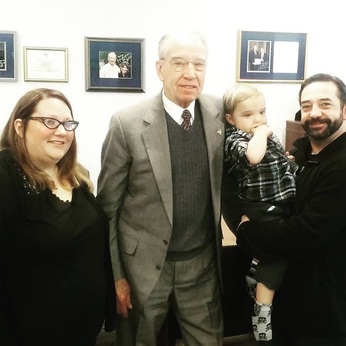Erin Miller, Iowa
Erin Miller never imagined herself an activist, working the halls of the Iowa state capitol and lobbying her senator, Chuck Grassley. But parenthood put her in the position of advocating for her son, and cannabis has proven to be the best medicine for him.
 When he reaches his fourth birthday in July, Abram will have been seizure-free for just over a year. In the 11 months since his parents decided to follow a neurologist’s advice to try cannabis oil extracts, Abram’s pharmaceutical medications have been drastically reduced, as have their debilitating side effects. A year ago, those side effects had gotten so severe that he could no longer walk or talk. Now, the highly addictive Klonopin has been tapered down by three-quarters, and if he remains seizure-free the next six months, it will be eliminated completely.
When he reaches his fourth birthday in July, Abram will have been seizure-free for just over a year. In the 11 months since his parents decided to follow a neurologist’s advice to try cannabis oil extracts, Abram’s pharmaceutical medications have been drastically reduced, as have their debilitating side effects. A year ago, those side effects had gotten so severe that he could no longer walk or talk. Now, the highly addictive Klonopin has been tapered down by three-quarters, and if he remains seizure-free the next six months, it will be eliminated completely.
Grappling with the constraints of Iowa’s medical cannabis law transformed Abram’s mother, Erin, into an activist. At the time the neurologist recommended they try treating Abram with cannabis, their state’s law had only recently gone into effect. That 2014 law only provides an affirmative defense for the possession and use of CBD extracts, and only for patients with intractable epilepsy and their caregivers. Abram’s initial diagnoses did not meet the state’s requirements to qualify his parents for legal protections, so Erin reached out to her elected representatives and other state lawmakers for help. In lieu of help, she got advice: leave the state.
Many American families in their position have become medical cannabis refugees, but Abram’s family went the route of civil disobedience, consciously breaking the law to provide for his welfare. Now, Abram’s mother and father are both legal caregivers in Iowa, as is the grandmother with whom they all live. But those legal protections did not come easily. The seven-month process entailed consultations with three different specialists at three different hospitals, as well as direct lobbying of state officials to recognize his condition as qualifying under the law.
As arduous as that process was, it pales in comparison to the challenges the family has met since bringing Abram home from the hospital after an unexpected stay in the neonatal intensive care unit. Developmental issues were immediately apparent, sending Abram to a series of specialists who provided a succession of diagnoses.
Not long after birth doctors determined he has a chromosome disorder so rare only 35 cases have been reported in the last 30 years. Then a pineal cyst was discovered in the center of his brain. A traumatic seizure that took them to the emergency room led to an epilepsy diagnosis at age two. Abram’s seizures worsened in January 2015, and by April he was no longer able to speak or walk. The family sought treatment at a specialty epilepsy unit in Minnesota, where he was prescribed yet another anti-epilepsy drug, Kleptra, that made his symptoms even worse.
At the Mayo Clinic, tests revealed he also has cortical dysplasia, a condition in which parts of the brain do not migrate to their normal position as it develops, creating misfires in the brain’s signaling that impede learning. Then, finally, just this past Christmas, Abram was conclusively diagnosed with UBE2A X-Linked Mental Retardation, a genetic disorder even more rare than his chromosome problem. Only eight cases of this genetic mutation exist in the medical literature, so it is not a condition any state lists as qualifying for medical cannabis.
“I just hope Abram’s story can make a difference for other patients and parents,” Erin says. To make sure it does, Erin blogs about Abram, publishes OpEds about medical cannabis, fields questions from other parents who see her in the media, and lobbies state lawmakers for a better medical cannabis program. Erin has even managed to get Abram and another a child with a seizure disorder in to see Sen. Chuck Grassley, the powerful chair of the U.S Senate’s Judiciary Committee where the bipartisan Compassionate Access, Research Expansion, and Respect States Act (CARERS) of 2015 has been stuck since it was introduced, waiting for a hearing. When confronted with the before-and-after photos of Abram at the meeting, Sen. Grassley conceded that “you really can see the difference” cannabis makes.
With continuing pressure on Sen. Grassley from activists such as Erin, Congress may yet get a chance to vote on the CARERS Act and make a difference for patients in the 42 states that allow for varying types of medical cannabis use.
This profile was originally published in the June 2016 ASA Activist Newsletter
Share this page





















